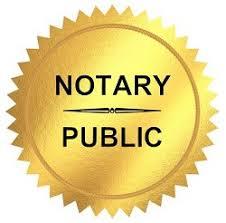Demystifying Notarial Work: Simplifying the Duty and Importance of Notaries
In the intricate internet of legal paperwork and confirmation, notaries stand as columns of guarantee and authenticity. Their role, frequently shrouded in mystery for many, lugs significant weight in ensuring the legitimacy and stability of important papers. As guardians of validity and reality, notaries play an essential part in our society, yet their work is not always completely comprehended. By unwinding the intricacies bordering notarial techniques and losing light on the significance of their acts, a clearer understanding arises of the important duty notaries play in supporting the textile of contractual and legal arrangements.
The Background of Notarial Work
How did notarial job advance with time to become an important component of lawful and organization deals? The history of notarial job go back to old human beings, where scribes played an essential role in tape-recording essential information and confirming papers. As cultures progressed, the need for a much more formalized system to make sure the legitimacy of agreements emerged. This caused the advancement of notaries, people selected by the state to work as objective witnesses in lawful matters.
During the Middle Ages, notaries got prominence in Europe, with their functions expanding to include drafting lawful papers, accrediting signatures, and maintaining documents. The increase of international profession further emphasized the relevance of notarial operate in validating contracts and arrangements across borders.
In the modern age, notaries continue to play an important role in legal and company deals by confirming identities, confirming the credibility of files, and stopping fraud. Their duty in licensing the credibility of agreements adds a layer of protection and depend the ever-evolving landscape of commerce and regulation.

Responsibilities and Duties of Notaries
Notaries play an important role in confirming the credibility of records and the identity of signatures. One of their main responsibilities is to witness the finalizing of vital papers, such as wills, actions, and agreements, to make sure that all celebrations are getting in into agreements knowingly and willingly.
They accredit duplicates of initial records, supplying assurance to organizations that the copies are real reproductions of the originals. Generally, the obligations and responsibilities of notaries are important in safeguarding the stability and legality of various files and deals - Notary.
Notarial Certificates and Signatures
Exemplifying meticulous attention to information, notarial certifications and signatures function as crucial parts in verifying the credibility of legal records. Notarial certificates normally contain important info such as the day of registration, the names of the notaries, a description of the document, and the notary's official seal. These certificates offer a clear document of the notarial act, guaranteeing that the file can be quickly recognized and traced back to the notary that oversaw the procedure.
Trademarks play a pivotal role in notarial job, as they indicate the agreement and approval of the parties involved. Notaries thoroughly witness the signing of papers to confirm the identity of the signatures and confirm that they are signing of their very own complimentary will. By affixing their official seal and signature to the record, notaries license that the necessary procedures have actually been adhered to and that the record is enforceable and legitimate.
In essence, notarial certifications and trademarks are the characteristic of credibility in lawful deals, giving guarantee to all parties included that the documents are genuine and binding.
Significance of Notarial Acts
Registration Process Described
The notarization process typically begins with the private providing the document to a notary public. As soon as the identity is confirmed, the notary ensures that the private authorizing the record does so voluntarily and without any type of browbeating.

Final Thought

Notarial certifications typically contain vital info such as the date of registration, the names of the signatories, a description of home the document, and the notary's main seal. These certifications supply a clear document of the notarial act, ensuring that the file can be conveniently recognized and traced back to the notary that looked after the process.
By fastening their official seal and signature to the document, notaries accredit that the required procedures have actually been complied with and that the record is legitimate and enforceable.
By verifying the identity of the signatories, confirming their willingness to enter into the agreement, and certifying the day and location of the finalizing, notaries play a critical function in upholding the validity of lawful files.After the paper is authorized, the notary will affix their official seal or stamp onto the record.